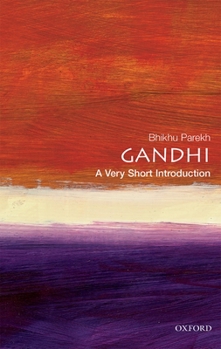Gandhi: A Very Short Introduction
(Part of the Oxford's Very Short Introductions series Series and Very Short Introductions (#37) Series)
Select Format
Select Condition 
Book Overview
Mohandas Karamchand Gandhi (1869-1948) was one of the few men in history to fight simultaneously on moral, religious, political, social, economic, and cultural fronts. During his time as a lawyer in South Africa he developed his strategy of non-violence: the idea of opposing unjust laws by non-violent protest. He led the Indian National Congress party in three major campaigns against British rule, each culminating in his arrest. In Gandhi, a short introduction to Gandhi's life and thought, Bhikhu Parekh outlines both Gandhi's major philosophical insights and the limitations of his thought. Written with extensive access to Gandhi's writings in Indian languages to which most commentators have little or no access, Parekh looks at Gandhi's cosmocentric anthropology, his spiritual view of politics, and his theories of oppression, non-violent action, and active citizenship. He also considers how the success of Gandhi's principles were limited by his lack of coherent theories of evil, and of state and power. Gandhi's view of man as ascetic allows no room for expressions of the cultural, artistic, or intellectual. Furthermore, he was so hostile to modern civilization that he was unable to appreciate its complex dialectic or offer a meaningful narrative. Nevertheless, Gandhi's life and thought had an enormous impact on the Indian nation, and he continues to be widely revered--known before and after his assassination as Mahatma, the Great Soul.
Format:Paperback
Language:English
ISBN:0192854577
ISBN13:9780192854575
Release Date:June 2001
Publisher:Oxford University Press
Length:160 Pages
Weight:0.34 lbs.
Dimensions:0.4" x 4.5" x 7.0"
Customer Reviews
3 ratings
A solid introduction to Gandhi's life and thought
Published by Thriftbooks.com User , 14 years ago
For those seeking a very brief introduction to Gandhi's life and thought, this ought to do the trick. At one point in my life I read intensely if briefly about Gandhi, reading a couple of dozen books by and on him. This book would not break into the books that I would most recommend, but it would be one that I would recommend as a possible first book. Parekh has a deep understanding of the context of Gandhi's thought, which was not purely Indian despite being largely grounded in Hinduism, with major outside influences. The book is stronger on Gandhi's thought than his life. The biographical details are, in fact, quite minimal, but many books emphasize Gandhi the person so much more than Gandhi the thinker, this is a welcome correction. Although anyone wanting to know about Gandhi should immediately go on from this to read a good biography on Gandhi (the classic biography by Louis Fischer remains a great first read about Gandhi, though the best English language biography is that by Judith Brown), as well as Gandhi's own so-called autobiography, this gives one a glimpse into what made Gandhi click. Anyone wanting to know about Gandhi should plan minimally on reading as well an anthology of Gandhi's own writings in addition to the autobiography (the three-volume edition edited by Iyer is the best), as well as the aforementioned books by Fischer and Brown. I also strongly recommend the book on Gandhi by Ved Mehta, which is deeply insightful and refutes many Western misunderstandings of his thought. Gandhi is one of the most inspirational figures of the past century. The impact on my own life has been considerable. It was because of him that I became a vegetarian and through his reverence for life I became deeply interested in showing respect for all humans and nonhumans. Definitely read this book, but plan on reading much more. Gandhi is not one of the great systematic thinkers of our age, but he is one of the most moral and visionary. He also combined idealism and pragmatism more successfully than any other figure I can name.
Organized, thorough, and concise
Published by Thriftbooks.com User , 17 years ago
The first half or so of the book is dedicated to a chronological biography. The second half has sections dedicated to the different facets of Gandhi's contributions. Not only was Gandhi a remarkable man, but I think Parekh does his memory justice with an equally thoughtful and evenhanded treatment of his legacy. Well done!
This book was fascinating
Published by Thriftbooks.com User , 25 years ago
I had just finished reading this wonderful book on Mohandhas Karamchand Gandhi. It touched my heart. I am only 12 years old and I am very glad to have an uncle like Bhikhu Parekh(the author of the book). I hope you read this great book on how wonderful Gandhi was to his people and how he fought for the independence of his country.






